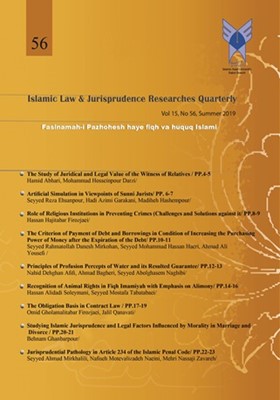The Criterion of Payment of Debt and Borrowings in Condition of Increasing the Purchasing Power of Money after the Expiration of the Debt
Subject Areas : Private lawSeyyed Rahmatollah Danesh Mirkohan 1 * , Seyyed Mohammad Hassan Haeri 2 , Ahmad Ali Yousefi 3
1 - Assistant Professor in Islamic Sciences, Payam Noor University, Tehran, Iran
2 - Professor in Theology, Ferdowsi Publication, Mashhad, Iran
3 - Associate Professor in Economics, Islamic Thought & Culture Center, Qom, Iran
Keywords: Debt, Credit money, Payment of debt, Increase in value of money,
Abstract :
The value of credit money may increase due to some reasons. In the premise of devaluation, there are clear jurisprudential views about the amount of repayment of debt after maturity. However, in case that the value of money increases, how much the debtor should repay? Since the actual due (right) of the creditor and debtor is jurisprudentially an important issue, this question must be clearly answered. Answering to this important question, on one hand, requires a precise examination of some aspects of the issue of credit money, and, on the other hand, needs the presentation of clear jurisprudential proofs. According to the stated assumptions, the research hypothesis is as follows: The purchasing power of money in the debt is the criterion of payment of debt in the premise of the increased value of the money. Using a descriptive-analytical method and collecting library data, we concluded that in the event of a sharp increase in the value of money, and while the debtor is not able to pay the debt at maturity date, he must pay an amount lower than the nominal amount received to the creditor. However, in the event of a slight increase in the value of the money, the payment of the nominal amount is considered the full payment of the debt. If the purchasing power of money has increased since the time of its receiving until the time of its payment, and the debtor pays the debt after the deadline despite the ability to pay, he needs to pay the received nominal to the creditor to compensate the losses.
منابع انگلیسی
_||_
Ameli Jabaei, Z .(1992). Masalek Al-Afham Ela Tanghih Sharayeh Al-Islam. Qom: Islamic Publication Office.
Ameli, A. (1993). Jameol Maghased Fi Sharhel Qavaed. Qom: Islamic Publication Office.
Farahidy, K. (1989). Ketab Al-Eyn. Qom: Hejrat Publication.
Helli, A . (2009). Izah Favayed Fi Sharh Moshkelatel Qavaed. Qom: Esmaeilian Institute.
Helli, H. (1989). Ershad Al-Azhan La Akham Al-Iman. Qom: Islamic Publication Office.
Helli, H. (1992). Mokhtalef Al-Shiah Fi Ahkam Al-Shariah. Qom: Islamic Publication Office.
Ibn Edris, M. (1989). Al-Saraer Al-Havi Le Tahrir Al-Fatavi. Qom: Islamic Publication Office.
Ibn Manzour, M. (No date). Lesan Al-Arab. Beirut: Dar Sader.
Ibn zohre, H. (1993). Ghaniat Al-Nozo Ela Elmi Al-Osoul Val Forou. Qom: Imam Sadiq Institute.
Jafari, M . (1994). Rights of liabilities. Tehran: Tehran University Publication.
Javaher, M. (1983). Javaher Al-Kalam Fi Sharh Sharaye Al-Islam. Beirut: Arab Publication Office.
Katozian, N. (2002). Civil law of wealth and property. Tehran: Dadgostar Publication.
Makarem Shirazi, N. (2006). Esteftaat Jadid. Qom: Imam Ali Ibn Abi Taleb.
Maki Ameli, S. (1993). Hashiatol Ershad. Qom: Islamic Publication Office.
Makki Ameli, S. (1989). Al-Lomoatol Dameshghiah fi Feghhol Imamiah. Beirut: Islamic Office.
Mohaghegh Damad, S. M. (2010). Jurisprudent law. Qom: Islamic Science Publication.
Prechter, R. (2012). The guide to understanding deflation. New York: New York Publication.
Razi, A. (1986). Al-Kafi. Tehran: Tehran Publication Office.
Sadr, S .(2000). Al-Islam Yaghoud Al-Hayat. Qom: Shahid Sadr Institute.
Tarmazi, M. (1982). Sonnan Al-Tarmazi. Beirut: Islamic Publication.
Toreihi, F. (1996). Majmaol Bahrein. Tehran: Mortazavi Publication.

